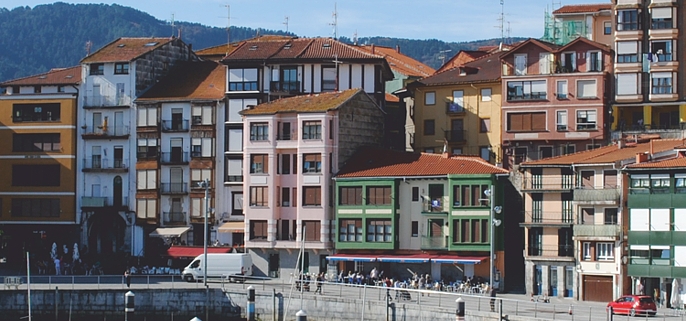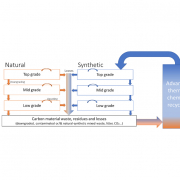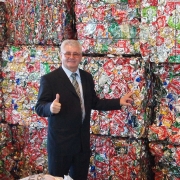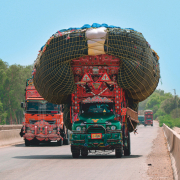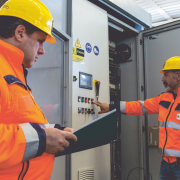Basque Country: On Its Way to a European Reference Region
Basque Country – or in Basque: Euskal Autonomia Erkidegoa – is an “autonomous” region in Spain. The habit of waste recycling in this “Autonomous Community” is more common compared to Spain as a whole.
According to official figures, a high percentage of Basque families recycle paper and cardboard (92.3 percent), glass (91.6 percent) and plastic as well as metal (90.2 percent), while the separation of organic waste is much less widespread (32.2 percent). Collecting exclusively organic waste is implanted to a certain extent only in Bizkaia (43.1 percent), in medium-sized (50.8 percent) and small (45.3 percent) municipalities, and it is lagging rather behind in Álava (27.9 percent) and, above all, in Gipuzkoa (16.8 percent). In Spain as a whole, the recycling of paper, glass, plastics and metal is between 70 and 75 percent less than in the Basque Country, while the habit of separating organic waste is higher (60 percent).
The Country follows the Waste Framework Directive, adopted the “Basque Environmental Strategy for Sustainable Development (2002-2020)” identifying “responsible management of resources and waste” as one of its goals and published the “Plan for the Prevention and Management of Waste in the Basque Autonomous Community 2020”. Its main objectives include the reduction of the total amount of waste generated by ten percent for 2020, the increase of the selective collection and separation of waste to at least 75 percent for 2020 and set up collection systems for problematic waste streams, and the progression of the proportion of waste which is prepared for reuse, recycled and recovered to 60 percent by 2020.
Action Programs scheduled
The Plan – based on figures of 2010 with an amount of waste generated of 5,430,279 tons – indicates five sectors of activity responsible for 94.5 percent of all waste produced: Metal manufacturing and processing sector (32 percent), construction sector (23 percent), municipal waste and similar (20 percent), paper and wood sector (11 percent), and finally the water and waste treatment sector (10 percent). It showed, that the treatments of recovery (51 percent) and disposal (49 percent) were applied in similar percentages. 47 percent of the waste produced was sent to landfill; 45 percent recycled; six percent used to energy recovery and <0,1 percent incinerated. And admittedly hazardous contaminated land, salt slags from the secondary smelting of aluminum, halogenated waste and surplus treated waste such as organic matter had to be exported.
New business opportunities encouraged
Five so-called Action Programs were scheduled by the Plan and funded by 6,727,000 Euro: for Prevention (41 percent), for Selective Collection and Separation (six percent), for Preparation for reuse, Recycling and Recovery (29 percent), for Optimizing Disposal (22 percent) and for Exemplary Behavior of Authorities and Good Governance (two percent). And several “Circular Economy and Waste Recovery Demonstration Projects” were budgeted by 12,5 percent of the total envisaged for the Plan. The projects were funded by up to 70 percent and limited to 30,000 Euro and stayed in constant and close collaboration and monitoring to the Department of Environment and Regional Policy. Eight public-private partnership projects followed the first call in 2011 and intended – among others – a pulse combustion drying for de-inking sludge, the recovery of aggregate iron, steel and ashes through incineration of wastewater sludge, a DCW recovery in manufacturing and use of soil-cement and gravel-cement, an optimized “washing closed circuit and reuse of cleaning rags and clothes impregnated with hazardous substances”, and the development of extrusion profiles for electrical cabling plastic waste.
The results created additional demand for solutions. A “Circular Economy Demonstration Projects” initiative was launched in 2014 and repeated calls in 2014, 2015 and 2016. It oriented on the “2020 Waste Prevention and Management Plan” and the “Environmental Framework Programme for the Basque Country 2020”. Its basic objective was to establish new solutions in the market and encourage business opportunities in the circular economy. Arising from various “Competitive Intelligence and Technology Watch” studies, Ihobe – the Basque Environmental Management Company – had discovered new business opportunities. The opportunities were found in secondary plastics, metal waste, used fireproofing material, critical materials, reuse of automotive components and remanufacturing of capital assets, Ihobe gave account.
Successful investments
According to the preliminary report from December 2016 regarding the 36 Circular Economy Demonstration Initiatives, the projects could be classified based on their level of transferability to other areas of industry, the intensity of the collaboration between companies in the value chain, the level of innovation and the relevance of public sector collaboration, so that, beyond financing, the solutions demonstrated could become established in the market. They covered the whole range of material treatment from the automotive industry and electrical equipment over metals until plastic, paper and textiles.
The demonstration projects helped to accelerate the circular economy in the metal and construction/works sectors, both responsible for steelworks slag from thermal processes of the metallurgy industry and paper-pulp sludge from the paper sector and adding up to more than 45 percent of all waste generated in the Basque Country. And they were successful: A forecast of results shows that an estimated 276,000 tons of waste would annually be diverted from landfill and would be upcycled from low-value recycled material. The potential turnover of all new business solutions totals at 38.7 million Euro. In other words: Each 100,000 Euro invested by the public is estimated to result in 15,330,000 saved tons of material per year and in a 2.15 million Euro turnover.
A new economic model
“The Basque Country is making a commitment to a new economic model based on the Circular Economy … – a new economy based on the principle of ‘closing the life cycle‘ of products, services, waste, materials, water and energy”, SPRI, the Basque business development agency, emphasizes. This does not only relate to the aforementioned projects but describes the existing waste management sector as well. There are several main companies like Indumetal Recycling, an industry specialist with extensive experience in the management of WEEE; FCC – Ambito, dedicated exclusively to the management of industrial waste of all kinds, both hazardous and non-hazardous; and Eko Rec, a company specialized in the recycling of PET – its R&D department is involved in research into new applications for materials that are not yet recyclable.
Regarding treatment plants, the Koopera Reusing Center is the first comprehensive state plan for the reuse of all types of objects and goods such as clothing, shoes, bazaar, toys, books, electronics and appliances. The treatment plant proposes a comprehensive solution in the field of waste recycling and has been listed among the best regional case studies in Europe. Zabalgarbi’s urban solid waste energy valorization plant makes use of innovative technology for the energy valorization of this type of waste, which has allowed for increasing its energy performance in 87 percent compared to other conventional urban solid waste plants of the same capacity. And in 2015, the building of a waste-to-energy & MBT treatment plant for 200,000 tons per year in San Sebastian was sealed. Finally, the Basque Ecodesign Center delivers know-how and innovation, constituted in collaboration between private sector companies and the Basque Government, to boost product eco-innovation in the supply chain of the Basque industrial sector. The center helped to involve eight major Basque multinationals to employ ‘green supply chain management’.
Circular economy advancing rapidly
“Due to its small size and intensive industrial activity, the Basque Country is a region in which the circular economy is advancing rapidly”, Josean Galera, deputy environment minister for the Basque government, underlined already in 2014. The country’s import-dependency of 75 percent could be offset by doubling material productivity, waste flow disposal bans and waste recovery solutions. In his perspective, the country could satisfy all the requirements “for becoming a ‘guinea pig’ region for a circular economy initiative”. The same goes for SPRI stressing that “the region is a world-class area in Europe in the field of Eco-industries and the Circular Economy”.
According to SPRI, the Basque Country is making a commitment to a new economic model, facilitating the production of goods and services while reducing consumption and waste of raw materials, water and energy sources. A new economy based on the principle of “closing the life cycle” of products, services, waste, materials, water and energy. With a series of far-reaching competitive advantages, Basque Country is to position itself as a European reference region in the circular economy, and it facilitates the attraction of investment, talent, technology, and development of new strategic projects, the “Invest in Basque Country” – website emphasizes.
Photo: pixabay
GR 2/2018

